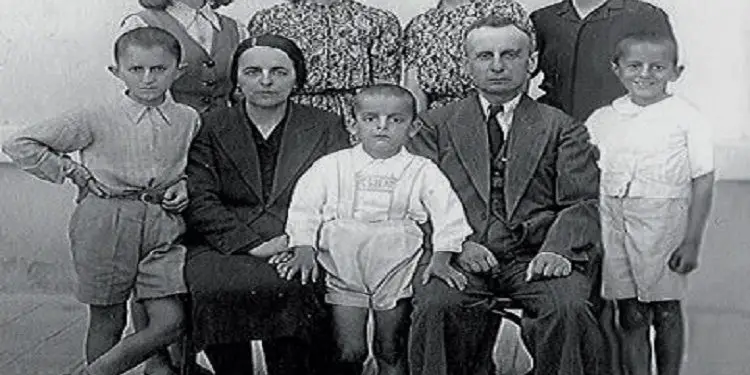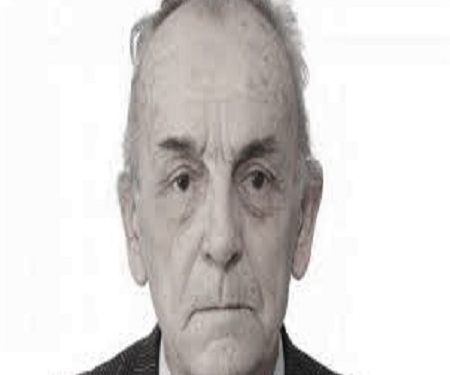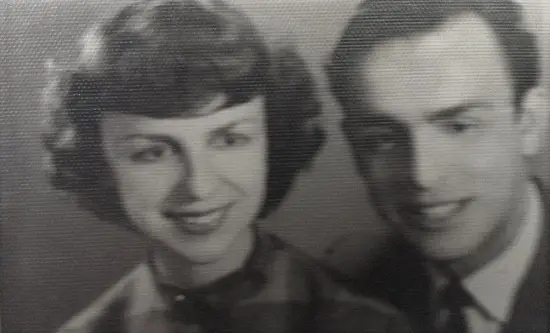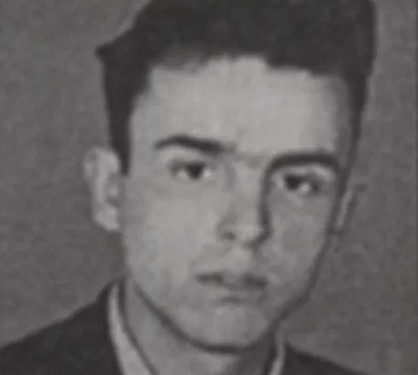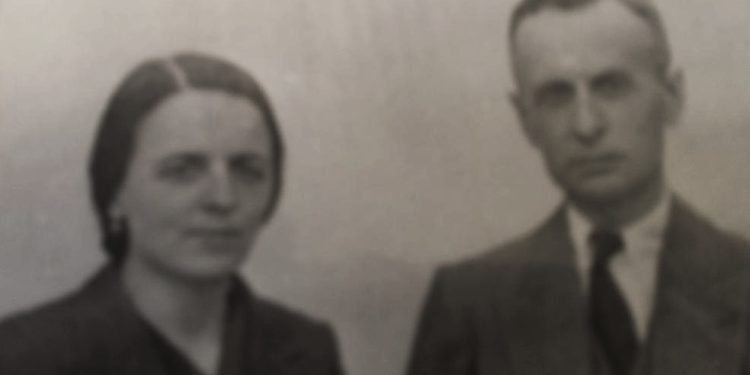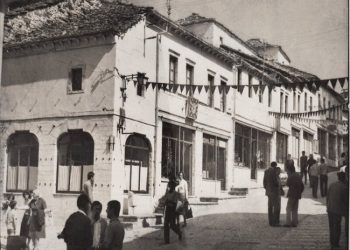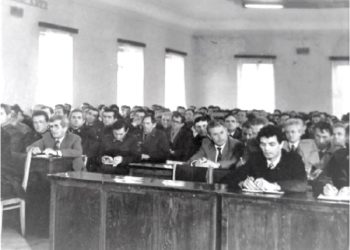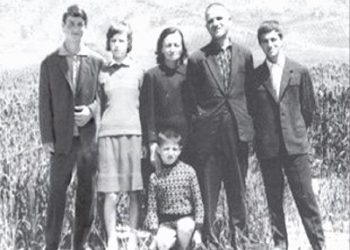By Reshat Kripa
The first part
Memorie.al / “Sometimes, when difficult trials fall on a child’s head from the tenderest age in the secret recesses of his soul, a kind of scale is born, a beautiful scale, with which he weighs the affairs of this world . Feeling himself innocent, he submitted to his fate without making a sound. I didn’t cry at all. He, who has no reason to be scolded, does not scold others”!
(Viktor Hugo, “The Man Who Laughs”)
Dedicated to family and society,
Author
THE UNFINISHED DIARY OF MY FATHER
It is an old notebook with notes. A Chinese notebook, from those used in the fifties. It was written with a fountain pen. In places, the letters are beginning to fade. Here and there you can also see a stain, caused by a drop of water that fell on them. Time has done its job. It is my father diary, an unfinished diary, started in 1957. The old age, the problems he had to face, the difficult economic situation, the untimely death of our mother, did not allow him to finish it.
He had been thinking about writing for a long time, but the problems I mentioned above prevented him. Finally, one day he told us:
– “I want to write a diary about the history of our family. What do you say, do you agree?
We were very happy and urged him to start as soon as possible. We bought him a notebook and a pen and he started writing.
Now, fifty years from the day I started this journal, I re-read it again. Through him I learn the goals he had, his family background and many other important moments of his life. Above all, I am drawn to the preface, which is a kind of testament to us.
I am reproducing this preface in full, as he wrote it:
For a long time I have wanted to write something about the origin of our family, about my life and many other things. Between today and tomorrow, a full ten years passed without writing anything. One evening, by chance, while talking to my family, I expressed this desire and they immediately approved, and even begged me to start it as soon as possible.
So today I am starting this work, to leave as a memory to all the future generations of our family. Through it they will get to know and learn where our family comes from, which today has the surname Kripa, who our ancestors are and where they came from. Then I will write the biography of our grandfather, whose name was Halil, and of my father, whose name was Hamdi. After that I will write my biography and memories, from the day I was born until today, when I am sixty-five years old. I will tell many things from my life, from old patriarchal customs and many other things, about which future generations, when they read them, will be surprised.
After I finish what I mentioned above, I will also write a will, which I will leave to my sons and daughters, which for their future, will serve them a lot, if they will be able to respect and implement it properly. I am sure that with the education and culture that I have given them, they will surely respect the advice of their beloved father. So I too, after my death, in that life I will sleep spiritually calm and happy forever, since I am leaving behind four daughters and three sons like Asllana, who will know how to honor me and themselves.
I want to remind you of one thing. My love for children has been equal for each of them. But in this article I will praise some of them a lot, while I will criticize some of them for their mistakes and shortcomings. I don’t want such a thing to be interpreted as if I didn’t love everyone equally. I am leaving this book as a bequest to my descendants, to take care of it and keep it well, not to lose it and not to tear it.
After a period of forty or fifty years has passed, my sons, or anyone from our family, this story that I started, he must also continue. If it gets old or torn, he must rewrite it and compile it into a printed book so that it remains valid forever.
If you, my descendants, will continue my path, then this book will have a historical value for our whole family, for centuries.
According to this newspaper, his grandfather Halil Efendiu was born in Serez, a city near Thessaloniki. After having served for a long time in the Turkish army, around 1870, he was transferred, with the duty of recruitment commander and the rank of captain (usbash), to the cities of Durrës, Tirana and finally Kruja. During the period he lived in Tirana, his only son, Hamdiu, was born, whom he raised and educated as a financier.
Then he married a girl from Krutan, Mahmudena. Shortly before Halil’s death, my grandfather had moved back to Durrës, where my father was also born, in 1892. Finally, at the beginning of the twentieth century, he was appointed director of the salt extraction company in Vlora. He exercised this duty for many years, until the day he died in 1942. This is precisely the reason why we bear the surname Kripa today.
The grandfather made sure that his children were educated. Tim sent him, after finishing elementary school (town), to Thessaloniki, where he continued his studies for six years. He spent the last two years in Istanbul, at “Robert College”. He also educated the other two sons, Hysni and Shyqyri, as well as the only daughter, Fitnet.
My father, Qazimi, returned to Albania when it was preparing to declare independence, in 1911. He was offered many kinds of official jobs. The country needed educated people. He did not accept. His inclination was trade. First, he opened a cafe and the profits he made, he put aside to invest them later where he had his goal.
In 1920, he married Myneveren, the daughter of Mehmet Radhima, a well-known lawyer of that time, former director of customs in Vlora in 1913-1914. The year he got married, he completed the construction of a two-story house, which at that time it was one of the best in the city. While in 1929, he built a factory for the production of olive oil. He also built a large store where he sold oil. But the factory was only valid for the winter season. Then he brought a threshing machine from Italy, with which he went from village to village, at harvest time.
In 1936, together with his brothers, they finished building another villa on the beach of Vlora, as well as a wooden summer house in Llogora. While in 1941, they bought a plot of land in the New Quarter, where they started building a new oil factory, bigger and more modern than the first one. In contrast to the other merchants of Vlora, who had turned their profits into florins, my father had the spirit of investment. He always said that if you don’t invest, you don’t get profit. It was the prototype of the modern trader.
As a result of the marriage, seven children were born: Liria, Qamileja, Drita, Fatushja, Agimi, Besniku and me.
I don’t know if I went on a bit too long. But I did this because these will be the characters of this writing. Each event described below will be associated with their names. Of course, there will be other characters that will be related to them.
My father has always been a man who was never involved in the problems of the country’s political parties. Their attitudes mattered little to him. But he was honest and patriotic.
He advised us to follow his path. But we did not listen to this order. Times had changed. They would grab you, maybe even without your will, in their vortex. Did we do good or bad? I do not know. I leave it to your judgment. Hear how the events unfolded and judge us.
WAR TIME
I was born on January 28, 1936. My mother told me that at the age of two and a half, I narrowly escaped death. July 1938. We were on family vacation at the beach villa. One afternoon, while my grandfather and grandmother were standing on the porch of the house drinking coffee, I escaped my parents’ control and headed towards the sea. I was standing on its shore, watching. The sea had big waves. A wave crashed and wet my feet. I laughed and took a few steps forward.
Another bigger wave crashed over me and knocked me into the water. Pulling away, he took me with him. I was drowning. Fortunately for me, at that time, the coachman “Zdrypni” was passing by. He had this nickname because he was originally from the north and when he arrived at the station, he always said; “crush, crush!”. It brought vacationers to the beach. He saw me drowning and immediately picked me up. The whole beach gathered. They took out the water I had drunk and mentioned me.
After a few days, a hedgehog passed there, one of those that predict fate. Mother asked her about my future and she, after taking a strand of my hair, said:
– The boy will go through a difficult youth, a difficult manhood and a peaceful old age.
My mother told me this prediction of the hedgehog shortly before she closed her eyes, wishing me that the third part of her prediction would be fulfilled.
January 1942. I was six years old. From this time my memory begins. Everything I write from now on will be my memories:
We were a big family. In addition to seven children and two parents, our family included our grandfather and grandmother as well as my father’s aunt, Hajria. There were also the families of two uncles, with whom we lived together. We were nineteen people in total.
Babaj was the eldest of the family. He had authority over all its other members. There were clear goals for the future of each of the children. Liria was engaged to Ali Tufa, a Kosovar who lived in Durrës and worked as a clerk at the State Bank branch. Qamileja continued her studies in the college opened by the nuns…! Drita and Fatushja continued their studies at the “Nana Mbretëneshë” Women’s Institute, which at that time was named “Nana Skanderbeg”, in Tirana. Even for us boys, he predicted that after we finished primary school, he would send us to continue abroad, just as his father had done with him.
* * *
It was evening. In the fire room, grandfather, grandmother, father and two uncles sat around the big fireplace. The women were preparing dinner. Freedom with Qamila, embroidery. They prepared the dowry of Freedom. The rest of us had gathered in a room on the first floor and were playing. A loud knock is heard at the door. Uncle got up and opened it. A group of Italian militiamen entered, commanded by a captain and accompanied by an Albanian, their translator.
– “We have come for control” – said the translator.
– “Order”! – answered the redeemed father
It was wartime and such checks were common in Albanian families at that time. They thoroughly checked all the rooms. They turned everything upside down. Finally, the room where Liria was. In the drawer of her bedside table, they found a letter sent to her by Drita from Tirana. The translator took the letter and read it. In it, she wrote enthusiastically about the great anti-fascist demonstration that took place in Tirana on November 28, 1941. The militia commander said something in Italian. Father and Liria were taken and imprisoned in Vlora prison.
I cried, because you seemed to me as if they would never come back. Mother took me in her bosom, saying:
– “Don’t cry because tomorrow they will come back again. Grandfather will release them”.
Actually, the grandfather was an influential person in Vlora. The next day he went to the Mayor, who was a friend of his, and told him what happened. He talked to the Italian authorities and the father was released that afternoon, while the sister was released after three days. After six months, the grandfather passed away.
The above event forced him to think about the future. As I wrote above, he had a keen sense of the prospect of trade. She realized that her future was Tirana. At that time she had begun to develop quite a bit. Decided to move there.
We got a house for rent, in an alley on “Rrugën e Kavaja”, in front of the one where Radio-Tirana used to be. The alley, if I’m not mistaken, was called “Myslym Llagami”. Today it bears the name “Islam Allah”. The house was a very beautiful two-story villa, owned by Selim Farka. It was huge. We and the family of an Italian lived in it. In addition, we also rented a shop in “Pazarin e Ri”, property of Met Maleshka. There were six shops. The first was ours, while the second, a manufacturing shop of Hysen Drishti, a merchant from Shkodran, who became a close friend of mine. The others, I don’t remember whose they were. The uncles stayed in Vlora to take care of the factory and the store.
* * *
September 1943. Preparations were made for Liria’s wedding. It was the first wedding in our family and, ironically, the only wedding that went right. The others have hardly felt, with very few people, the closest ones, enough to say that a wedding took place. A mixture of the traditional and the modern was observed. In addition to well-known Albanian songs and dances, modern songs and dances were also played. A new spirit had begun to enter the Albanian cities. The spirit of modern civilization, the spirit of citizenship.
The wedding began as usual, on Monday. All measures were taken for it to develop perfectly. Special care was taken with the invitations. Care had to be taken not to forget any of the friends or relatives. A cook who worked at the Hotel
“International”, prepared the dishes. One of the most popular orchestras of that time that of Radio-Tirana was also taken, along with its singer, Pjetër Gjini.
On Sunday, the sister went to the husband’s house in Durrës. It was said that she was the most beautiful bride that had entered the city that day. After two months, her husband was transferred to Prizren, as director of the State Bank. His sister also went with him.
Three days after her marriage, a serious incident happened in our alley. It was morning. We had just woken up from sleep and were getting ready to go to school, when we heard two revolver shots and shortly after them a scream, which was heartbreaking. We all ran outside. On the threshold of the opposite neighbor’s gate, the lifeless body of the only twenty-year-old son of the owner of the house lay bleeding.
His poor mother screamed and pulled out his hair over him. I turned my head from the other side of the alley and saw two people running and disappearing into another alley. They were probably the assassins.
– “They killed you, my son, they killed you”! – cried his mother.
The mother and other women approached and began to comfort him. Then came the men who lifted the corpse and carried it inside. Later came his father, a senior economist, who now worked in a private company.
We were confused. The beautiful face of that boy with the curly hair and the bullet mark on his forehead, I couldn’t get out of my mind. Qamileja saw me in that state and said:
– “Get inside, because this view is not for you”!
My father came back late together with a friend of his. They had been to console the family of the murdered. They entered the room and talked about the event that had happened. I listened with curiosity.
– “What did you do with the boy?” – I asked him.
– “My father is one of the leaders of the ‘Balli Kombëtar’ for Tirana. The boy had decided to go to the ‘Balli’ detachments, soon”.
– “Just for this?! Yes, this is inexplicable. What was wrong with me, that he would go to that gang? Aren’t both sides fighting for freedom”?!
– “The situation has changed, Qazim. Dissension has entered Albania. These are the first signs of a clash between the two forces, which until today were fighting together. Instead of fighting the invader, the Albanians have started killing each other. This is the Albanian tragedy. The fierce struggle for power has begun.”
I listened, but I didn’t understand anything they said.
I listened to their words and they seemed strange to me…!
What did these words have to do with the murder of that boy? The age I was in did not allow me to understand these problems. Memorie.al




